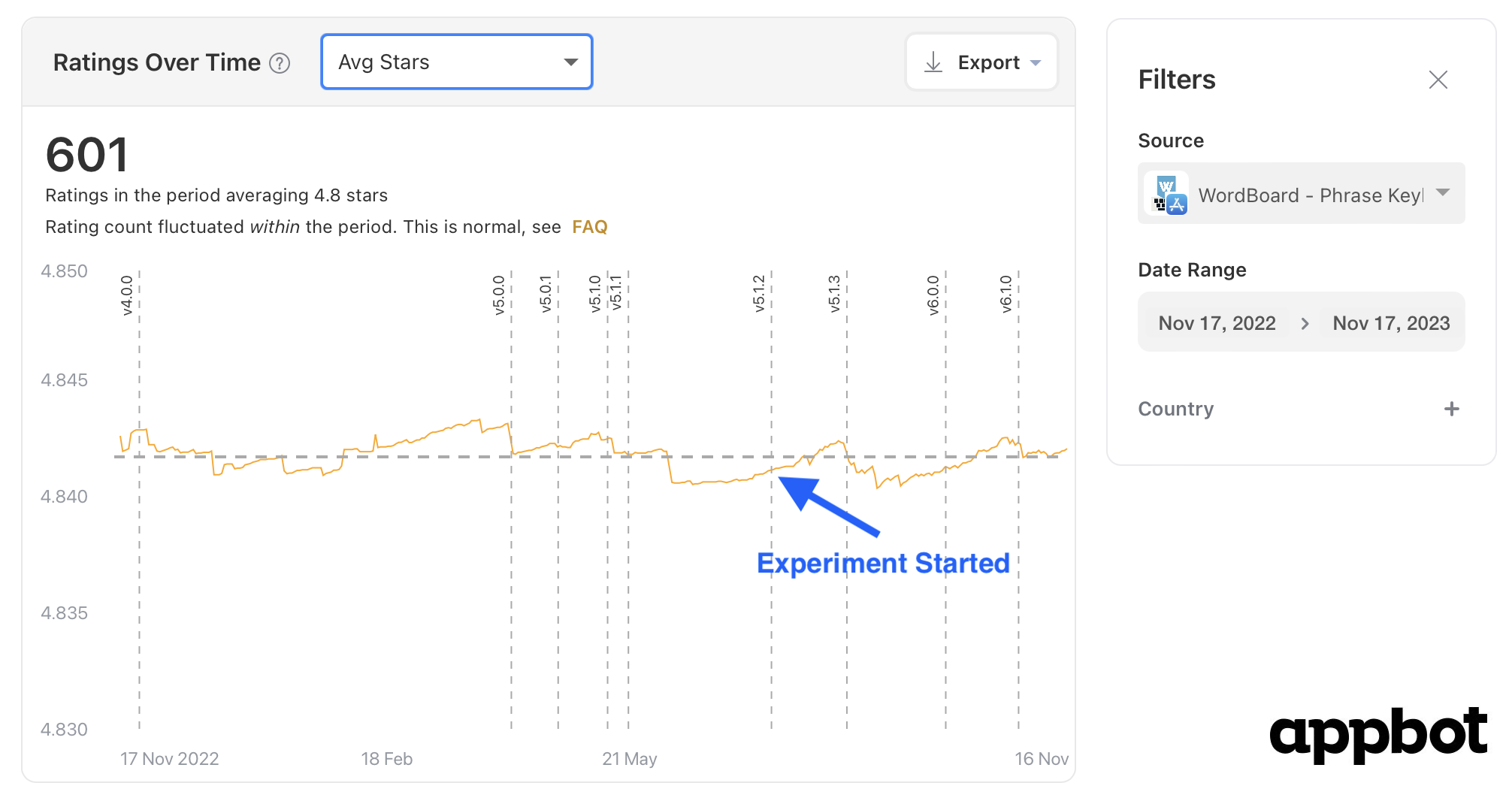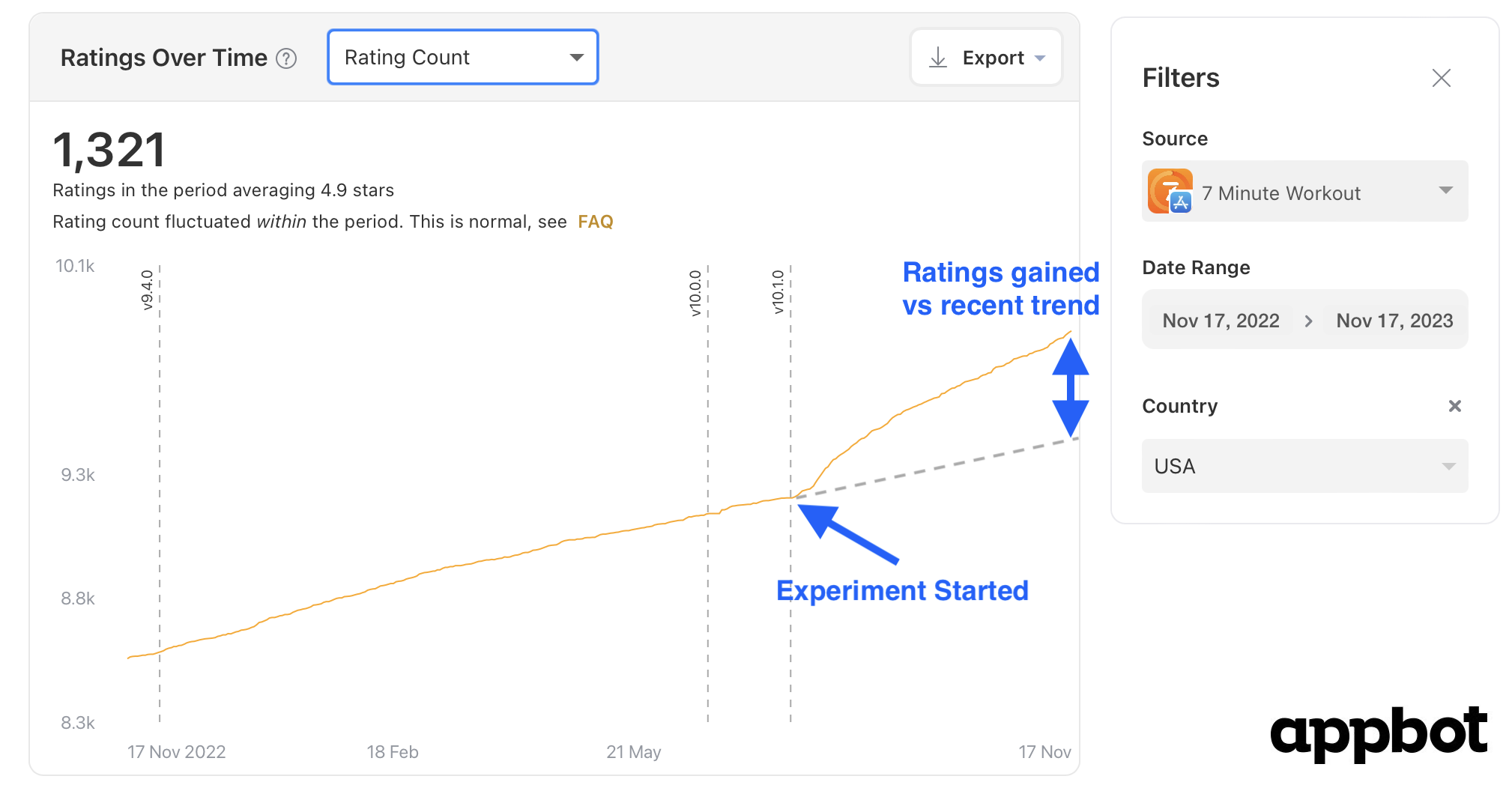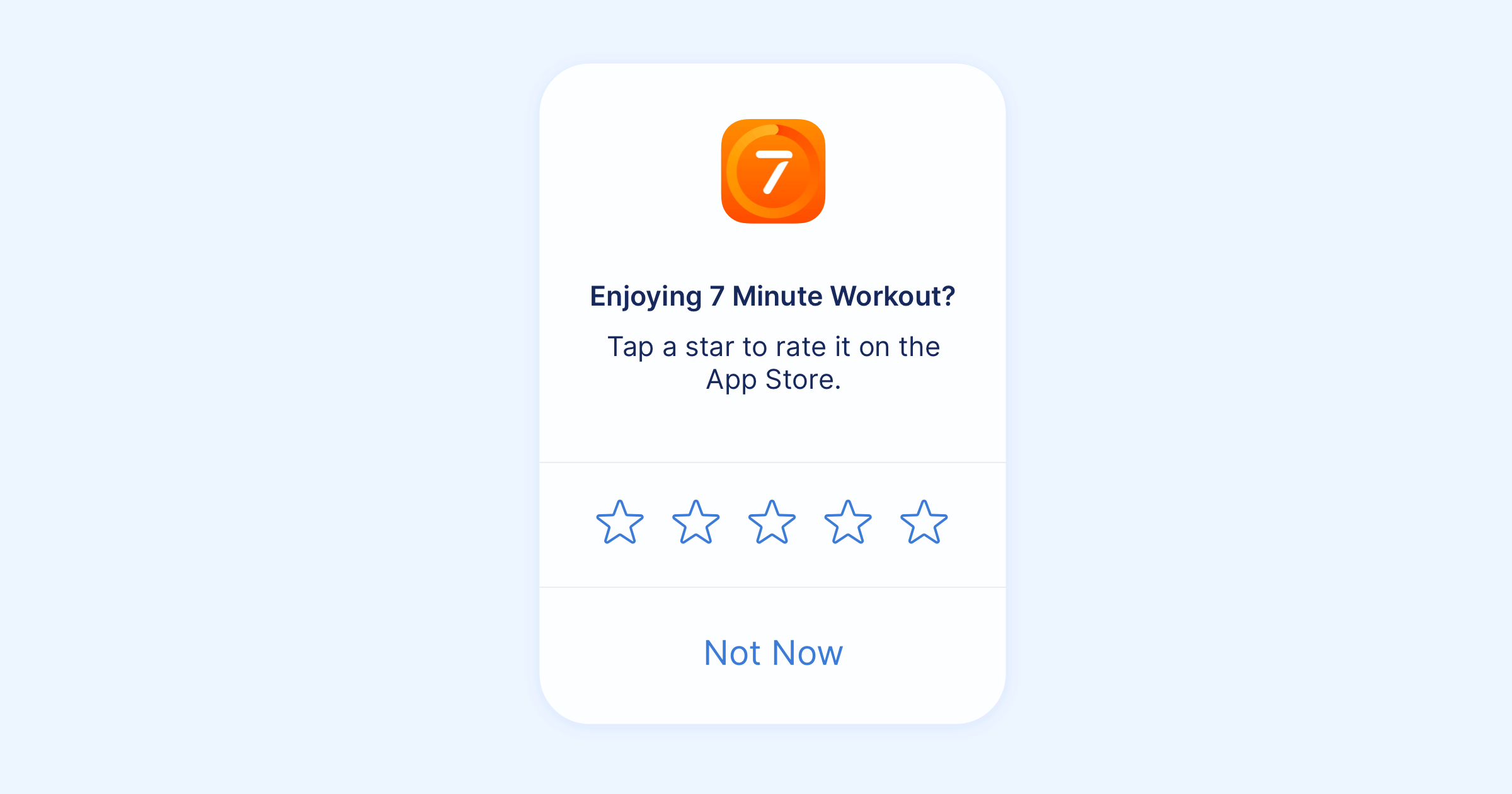You aren't prompting for app ratings and reviews often enough
Published 17th November, 2023 by Stuart Hall In the past, I've closely guarded my app's star rating. I feared that prompting too often or too early for more ratings and reviews would lead to a decline in star ratings. However, understanding the importance of the volume of ratings and reviews to various app store algorithms, I wanted to experiment with a higher volume.
In the past, I've closely guarded my app's star rating. I feared that prompting too often or too early for more ratings and reviews would lead to a decline in star ratings. However, understanding the importance of the volume of ratings and reviews to various app store algorithms, I wanted to experiment with a higher volume. Jump ahead:
Measure the effect of your ratings prompt
Join over 25% of the Fortune 100 and 35% of the top charting app developers using Appbot.
Try Appbot free now, no credit card needed →I have two apps on the iOS App Store, WordBoard and 7 Minute Workout, both of which receive reasonable amounts of downloads and revenue. They both have a steady stream of ratings and are both are over 4.8 stars. Not bad!
What's your prompting strategy?
It's really important you think about your prompting strategy. When will you prompt? How often? What's going to be the impact on your average stars vs the volume of ratings you'll receive?
Apple specifies that an app can prompt for a review up to three times in a 365-day period. This limitation is enforced by the iOS system itself when using SKStoreReviewController.requestReview(). It's important not to annoy the user or use up all those prompts too soon. I ensure there's at least 4 months between prompts:
import Foundation
import StoreKit
import UIKit
class RatingPromptManager {
private let userDefaults = UserDefaults.standard
private let lastPromptDateKey = "lastPromptDate"
func showRatingPromptIfNeeded(windowScene: UIWindowScene) {
guard shouldShowPrompt() else {
return
}
requestReview(in: windowScene)
updateLastPromptDate()
}
private func shouldShowPrompt() -> Bool {
guard let lastPromptDate = userDefaults.object(forKey: lastPromptDateKey) as? Date else {
// No prompt has been shown before, return true
return true
}
if let monthsPassed = Calendar.current.dateComponents([.month], from: lastPromptDate, to: Date()).month, monthsPassed >= 4 {
// It's been at least 4 months since the last prompt
return true
}
return false
}
private func requestReview(in windowScene: UIWindowScene) {
// Request the iOS native rating prompt for a specific window scene
SKStoreReviewController.requestReview(in: windowScene)
}
private func updateLastPromptDate() {
userDefaults.set(Date(), forKey: lastPromptDateKey)
}
}
My experiment
Historically, I'd prompt when I was confident someone was likely to give me a good review or rating. For example, after they completed a few workouts in 7 Minute Workout, or made a purchase in WordBoard. I was being really conservative, my theory was that better star ratings were worth the trade-off for lower volume.
However, there's much discussion about needing a larger volume of reviews to rank higher. Maybe there's a way to get more ratings without sacrificing my average stars.
For this experiment, I decided to prompt much sooner – after 1 workout was completed in 7 Minute Workout, or 1 key was added in WordBoard. The hypothesis was that prompting more often would generate a higher volume of ratings and reviews but potentially sacrifice the average rating.
The results
The results for both apps were very similar. There was a sharp increase in the velocity of new ratings being added, with little or no change in the average rating – a big win!
WordBoard:For WordBoard there was a significant uptick in the Rating Count chart, with a more than 400% boost in ratings per month! The average rating historically hovers around 4.84 stars and it remained there even with more frequent prompting.

 7 Minute Workout:
7 Minute Workout:The results were similar in terms of the volume of Ratings, with a significant increase in the slope of the chart. The average rating for 7 Minute Workout has been trending up over time and actually increased after more frequent prompting.


The results for both apps were very similar. There was a sharp increase in the velocity of new ratings being added, with little or no change in the average rating – a big win! What impact did this have on ranking and ASO? The signs are positive, but it's too early to tell. Follow me on Twitter / X to hear the results in a few months time.
Wrapping up
We should all be prompting more often, if it's a good app, then your star rating will hold up.
Happy Prompting!
Measure the effect of your ratings prompt
Join over 25% of the Fortune 100 and 35% of the top charting app developers using Appbot.
Try Appbot free now, no credit card needed →Where to from here?
- Explore the strategies employed by top grossing apps and learn how to achieve success.
- Master the art of writing an irresistible app store description that captures attention and drives downloads.
- Reply to app store reviews on the Apple and Google Play stores for happier customers and better star ratings.
- Dive into the secrets of creating addictive apps that keep users hooked and coming back for more.
About The Author

Stuart is Co-founder & Co-CEO of Appbot. Stuart has been involved in mobile as a developer, blogger and entrepreneur since the early days of the App Store. He built the 7 Minute Workout app in one night and blogged the story of growing the app to 2.3 million downloads before exiting to a large fitness device company. Previously he was the co-founder of the Discovr series of applications which achieved over 4 million downloads. You can connect with him on LinkedIn.
Enjoying the read? You may also like these
 Prompting for app reviews and ratings on iOS and Android
Prompting for app reviews and ratings on iOS and Android Want to learn WHEN to prompt an app review? See our advice after talking to thousands of mobile app developers on best techniques for IOS and Android apps.
Are App Store subscriptions better than one-off in-app purchases? Read about our subscription pricing experiments to the first $1k in MRR.
Want to learn WHEN to prompt an app review? See our advice after talking to thousands of mobile app developers on best techniques for IOS and Android apps.
Your app or game name is one of the most difficult, but also most important, decisions you will make.


